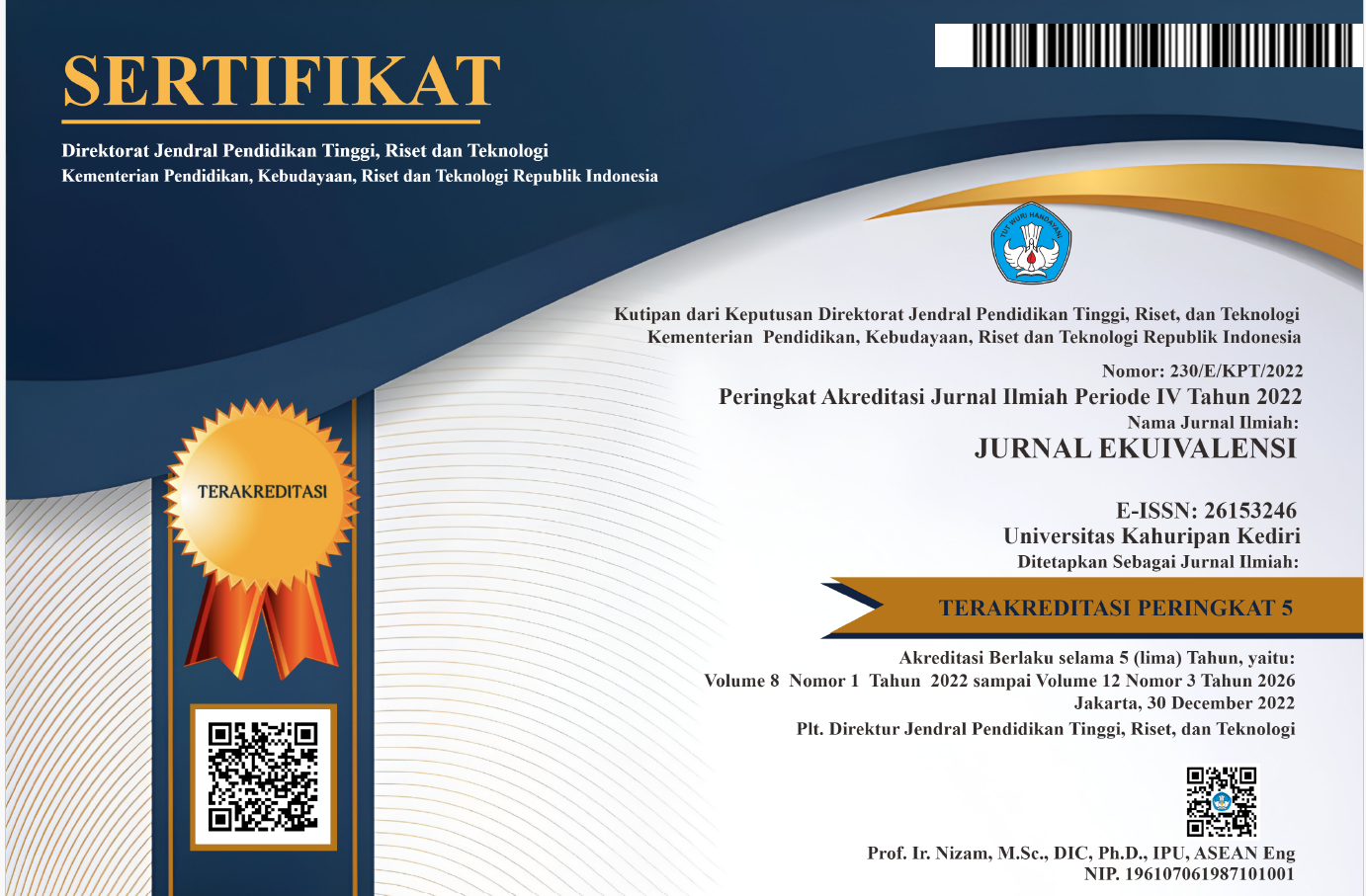Analisis Pengaruh Fleksibilitas Kerja Dan Pendapatan Dosen Terhadap Kinerja Dosen Studi Kasus Di Kampus IT&B Medan
DOI:
https://doi.org/10.51158/yzbe9383Keywords:
Fleksibilitas Kerja, Pendapatan, Kinerja DosenAbstract
The objective of this study is to examine the impact of work flexibility and employee compensation on the performance of lecturers at the IT&B Medan Campus. Flexibility is crucial in education, particularly when managing the requirements of the digital era, which enables the use of more adaptive work approaches. The remuneration of employees is a pivotal element that may significantly influence an individual's drive and productivity. This study employed a survey approach to distribute questionnaires to professors at the IT&B Medan Campus. We performed a comprehensive examination of the collected data using multiple linear regression to explore the relationship between job flexibility, income, and employee performance. The study results indicate that the ability to have flexible work arrangements has a significant and positive effect on the performance of lecturers. In addition, employee remuneration also has a significant impact, albeit its scale is relatively lower compared to that of work flexibility. These findings offer educational institution management useful insights into developing policies that encourage work flexibility and improve employee well-being, eventually resulting in optimal performance.
References
Alkandi, I. G., Khan, M. A., Fallatah, M., Alabdulhadi, A., Alanizan, S., & Alharbi, J. (2023). The Impact of Incentive and Reward Systems on Employee Performance in the Saudi Primary, Secondary, and Tertiary Industrial Sectors: A Mediating Influence of Employee Job Satisfaction. Sustainability (Switzerland), 15(4), 1–22. https://doi.org/10.3390/su15043415
Archer, R., Lewis, R., Yarker, J., Zernerova, L., & Flaxman, P. E. (2024). Increasing workforce psychological flexibility through organization-wide training: Influence on stress resilience, job burnout, and performance. Journal of Contextual Behavioral Science, 33(February), 1–10. https://doi.org/10.1016/j.jcbs.2024.100799
Astika, E., Nasib, Bhastary, M. D., Amalia, F., & Hou, A. (2022). Effect Of Work Environment And Workload On Employee Satisfaction. Jmari, 3(1), 1–12.
Audrin, B., Davoine, E., & Pichault, F. (2024). Building legitimacy in flexible work projects: A study on institutional, organizational, and individual narratives. International Journal of Project Management, 42(5), 1–13. https://doi.org/10.1016/j.ijproman.2024.102604
Butt, R. S. (2020). Effect of Job Stress, Benefits and Salary on Employee Job Satisfaction Based on Mediating and Moderating Role of Work Environment and Leadership: Evidence from Telecom Sector. International Journal of Engineering and Management Research, 10(03), 121–130. https://doi.org/10.31033/ijemr.10.3.19
Emmanuel, N., & Joseph, N. (2021). Employee and Organisational Performance: Employees Perception of Intrinsic and Extrinsic Rewards System. Applied Journal of Economics, Management and Social Sciences, 2(1), 26–32. https://doi.org/10.53790/ajmss.v2i1.5
Erhel, C., Guergoat-Larivière, M., & Mofakhami, M. (2024). Diversity of flexible working time arrangements and workers’ health: An analysis of a workers’ panel and linked employer-employee data for France. Social Science and Medicine, 356(July), 1–13. https://doi.org/10.1016/j.socscimed.2024.117129
Fadli, A., & Nasib. (2020). Mengenal Dasar Manajemen. CV. Pena Persada.
Hensellek, S., Kleine-Stegemann, L., & Kollmann, T. (2023). Entrepreneurial leadership, strategic flexibility, and venture performance: Does founders’ span of control matter? Journal of Business Research, 157(October 2021), 1–14. https://doi.org/10.1016/j.jbusres.2022.113544
Husain, Z., Dayan, B., & Sabir, I. (2024). Roles of organizational flexibility and organizational support on service innovation via organizational learning – A moderated mediation model. Journal of Open Innovation: Technology, Market, and Complexity, 10(3), 1–13. https://doi.org/10.1016/j.joitmc.2024.100367
Indiyati, F. T. K. A. P. P. D. (2021). Turnover Intention Among Lecturers in Private Higher Education: the Direct Impact of Financial Rewards and Mediation of Job Satisfaction and Effective Organizational Commitment. Jurnal Aplikasi Manajemen, 19(2), 282–295. https://doi.org/10.21776/ub.jam.2021.019.02.05
Jiang, L., Pan, Z., Luo, Y., Guo, Z., & Kou, D. (2023). More flexible and more innovative: the impact of flexible work arrangements on the innovation behavior of knowledge employees. Frontiers in Psychology, 14(April), 1–11. https://doi.org/10.3389/fpsyg.2023.1053242
Kraj?ík, M., Schmidt, D. A., & Baráth, M. (2023). Hybrid Work Model: An Approach to Work–Life Flexibility in a Changing Environmentfile:///C:/Users/ADLINA/Desktop/workstress,mentalhealth.pdf. Administrative Sciences, 13(6), 1–8.
Kurniawan, R. (2021). Impact of Perceived Supervisor Support and Rewards and Recognition Toward Performance Through Work Satisfaction and Employee Engagement in Employee Marketing Banks. Business and Entrepreneurial Review, 21(1), 171–192. https://doi.org/10.25105/ber.v21i1.9280
Lesmana, H. (2020). An Analysis Of Work Ethics And Incentives Influence On Employees Job Satisfaction. Systematic Reviews in Pharmacy, 11(2), 872–880.
Lubis, F. R. A., Syaifuddin, Lubis, Y., & Nasib. (2023). The Influence of Managerial Coaching and Team Autonomy on Employee Performance in Palm Oil Plantation and Processing Companies in Sumatra. Society, 11(2), 626–643. https://doi.org/10.33019/society.v11i2.587
Lubis, F. R. A., Syaifuddin, Sofiyan, Lubis, Y., & Nasib. (2023). Impact of Improving Organizational Climate , Employee Empowerment on Employee Engagement and Performance. Journal of System and Management Sciences, 13(2), 273–284. https://doi.org/10.33168/JSMS.2023.0219
Madhani, P. M. (2021). Effective Rewards and Recognition Strategy: Enhancing Employee Engagement, Customer Retention and Company Performance. The Journal of Total Rewards, 29(2), 39–48. https://ssrn.com/abstract=3672972
Martin, N. (2018). Pengaruh Lingkungan Kerja Dan Insentif Terhadap Kinerja Pegawai. Seminar Nasional Royal (SENAR) 2018, 423–428.
Mikalef, P. (2021). IT architecture flexibility and IT governance decentralisation as drivers of IT-enabled dynamic capabilities and competitive performance: The moderating effect of the external environment. European Journal of Information Systems, 30(5), 512–540. https://doi.org/10.1080/0960085X.2020.1808541
Mikelsone, E., Segers, J.-P., & Spilbergs, A. (2022). Governance of Web-Based Idea Management System Rewards: From the Perspective of Open Innovation. Journal of Open Innovation: Technology, Market, and Complexity, 8(2), 1–11. https://doi.org/10.3390/joitmc8020097
Nasib. (2022). Changes in the Performance of Millennial Employees during the Covid 19 Period at Four Star Hotels in Medan City. International Journal of Research and Review, 19(April), 320–324.
Nasib, & Chaniago, S. (2018). Pengaruh Insentif dan Gaya Kepemimpinan Terhadap Semangat Kerja Karyawan Pada PDAM Tirtanadi Medan. Abdi Ilmu, 1(1), 63–76.
Novirsari, E., Nasib, & Simanjuntak, M. S. M. (2022). Pengaruh Kompensasi dan Lingkungan Kerja terhadap Kepuasan Kerja Karyawan Pada PT . Sarana Industama Perkasa pengolah kelapa sawit . Sarana Industama Perkasa dituntut untuk terus meningkatkan kepuasan. CEMERLANG: Jurnal Manajemen Dan Ekonomi Bisnis, 2(2), 284–303.
Nugraha, R. Q. lham A. N. M. (2021). The effect of skill and incentives on employee performance at RSUD Dr. Soekardjo Tasikmalaya. Management and Business Review, 5(1), 18–28. https://doi.org/10.21067/mbr.v5i1.5374
Song, Y. (2020). Does Telework Stress Employees Out? A Study on Working at Home and Subjective Well-Being for Wage/Salary Workers. Journal of Happiness Studies, 21(7), 2649–2668. https://doi.org/10.1007/s10902-019-00196-6
Syaifuddin, Ananda, F. R., Lubis, Y., & Nasib. (2022). Can Life Satisfaction Become an Important Role in Increasing Employee Performance?? A Case Study. Journal of System and Management Sciences, 12(6), 379–397. https://doi.org/10.33168/JSMS.2022.0623
Syaifuddin, Efendi, B., Novirsari, E., Lubis, Y., & Nasib. (2023). Organizational Justice and Corporate Social Responsibility on Employee Performance?: The Mediating Role of Job Satisfaction. Journal of Logistics, Informatics and Service Science, 10(3), 151–165. https://doi.org/10.33168/JLISS.2023.0312
Taibah, D., & Ho, T. C. F. (2023). The Moderating Effect of Flexible Work Option on Structural Empowerment and Generation Z Contextual Performance. Behavioral Sciences, 13(3), 1–14. https://doi.org/10.3390/bs13030266
Uwasenpatience, & Irechukwu, E. N. (2023). Influence of Remuneration Structure on Employee Performance at MTN Rwandacell Headquarters. Journal of Human Resource &Leadership, 7(2), 26–43. https://doi.org/10.53819/81018102t4146
Wang, L., & Xie, T. (2023). Double-Edged Sword Effect of Flexible Work Arrangements on Employee Innovation Performance: From the Demands–Resources–Individual Effects Perspective. Sustainability (Switzerland), 15(13), 1–27. https://doi.org/10.3390/su151310159
Wang, Y., Cao, Y., Xi, N., Chen, H., & Gianni, M. (2021). High-Performance Work System , Strategic Flexibility , and Organizational Performance — The Moderating Role of Social Networks. Frontiers in Pharmacology, 12(November), 1–10. https://doi.org/10.3389/fpsyg.2021.670132
Zhou, J., Oldham, G. R., Chuang, A., & Hsu, R. S. (2021). Enhancing Employee Creativity: Effects of Choice, Rewards and Personality. Journal of Applied Psychology, 107(3), 503–513. https://doi.org/10.1037/apl0000900












